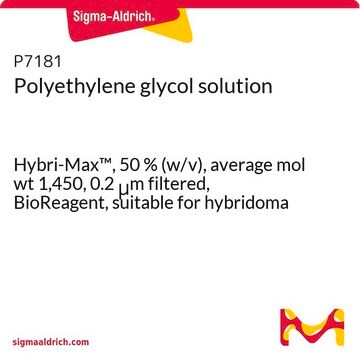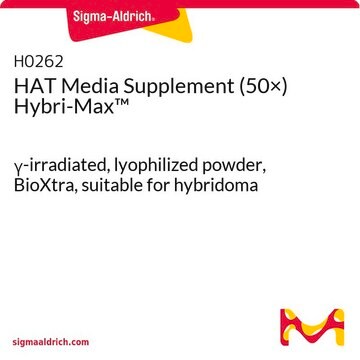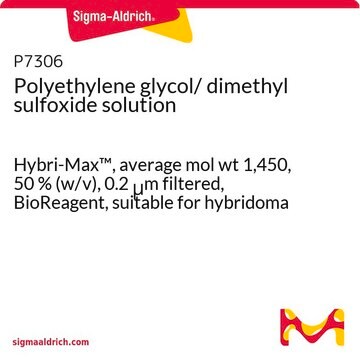P5402
Poly(ethylene glycol)
average mol wt 1,450
Synonym(s):
Polyethylene glycol, PEG
About This Item
Recommended Products
form
powder, flakes, or chunks
Quality Level
mol wt
average mol wt 1,450
pH
4.5-7.5
viscosity
26.5 cSt (210 °F)
mp
43-46 °C
solubility
water: soluble (approximately 720 mg/ml, 20 °C)
density
1.0919 g/mL at 60 °C
1.0761 g/mL at 80 °C
SMILES string
C(CO)O
InChI
1S/C2H6O2/c3-1-2-4/h3-4H,1-2H2
InChI key
LYCAIKOWRPUZTN-UHFFFAOYSA-N
Looking for similar products? Visit Product Comparison Guide
Application
- Composite scaffolds for bone regeneration: A study describes the development of a composite scaffold incorporating polyethylene glycol, gellan gum, and hydroxyapatite, with added ginseng derived Compound K, indicating potential applications in bone regeneration (Thangavelu et al., 2024).
- Enhanced wound healing: Research discusses AI-driven optimization of PCL/PEG electrospun scaffolds, highlighting their improved efficacy in in vivo wound healing applications (Virijević et al., 2024).
- Catch and release cryogels: Redox-responsive cryogels made from polyethylene glycol, which can capture and release proteins and cells, suggesting their potential in biomedical applications (Calik et al., 2024).
- Antibacterial hydrogels for wound dressing: A study presents light-degradable nanocomposite hydrogels containing polyethylene glycol, aimed at antibacterial wound dressing applications, demonstrating innovative uses in medical materials (Fang et al., 2024).
Storage Class Code
11 - Combustible Solids
WGK
WGK 1
Flash Point(F)
Not applicable
Flash Point(C)
Not applicable
Personal Protective Equipment
Choose from one of the most recent versions:
Certificates of Analysis (COA)
Don't see the Right Version?
If you require a particular version, you can look up a specific certificate by the Lot or Batch number.
Already Own This Product?
Find documentation for the products that you have recently purchased in the Document Library.
Customers Also Viewed
Our team of scientists has experience in all areas of research including Life Science, Material Science, Chemical Synthesis, Chromatography, Analytical and many others.
Contact Technical Service




